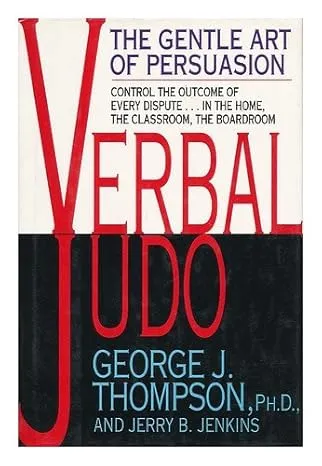About this book
Five Key Takeaways
- Master communication to safely navigate tense situations.
- Empathy is essential for reducing conflict and building rapport.
- Paraphrasing encourages understanding and prevents misunderstandings.
- Recognize emotional triggers to maintain control in conversations.
- Effective dialogue respects diverse perspectives and fosters cooperation.
-
Conflicts Escalate Due to Miscommunication
Misunderstandings in conversations often lead to conflicts. When communication fails, frustration builds, turning small disagreements into larger confrontations. This can happen in any setting.
In high-stress environments, like law enforcement, poor communication can even escalate into dangerous situations. Misaligned words and tone can intensify hostility instead of defusing it (Chapter 1).
Clear communication, on the other hand, works as a tool to de-escalate tension. It creates understanding, which calms emotions and promotes cooperation.
This is vital not just for professionals but for everyone. Whether it's at work or at home, clarity in speech can prevent unnecessary conflict.
When conversations are approached carefully, speakers have more control over outcomes. This adds to personal and social safety while minimizing stress for all involved.
The ripple effect of effective dialogue is broad. It strengthens relationships, reduces misunderstandings, and aids in creating positive environments.
In the larger context, mastering communication principles creates harmony, turning potential clashes into opportunities for collaboration and understanding.
Ultimately, the consequences of miscommunication remind us of the power of thoughtful language. This skill helps us shape better relationships and outcomes.
-
Empathy Changes the Tone of Conflict
Conflicts are often fueled when people feel misunderstood. Anger and hostility grow when emotions aren’t acknowledged during tense situations.
This lack of recognition can lead to defensive reactions or emotional shutdowns. These outcomes prevent constructive resolution and strain relationships further.
The real issue here is that empathy, though simple, is frequently overlooked in communication. Yet it holds the power to absorb tension effectively (Chapter 4).
Without it, dialogue remains one-sided, and meaningful connections are limited. This perpetuates a cycle of miscommunication and repeated conflict.
Thompson argues that empathy acts as a neutralizer. It redirects emotional energy and creates opportunities for calm, collaborative conversations.
He supports this by recounting stories where empathy literally changed the direction of life-threatening conflicts. This proves its undeniable value.
The takeaway? Empathy makes conversations less about winning and more about understanding. It’s a subtle yet transformational tool in managing emotions.
By embedding empathy into our daily interactions, the tone of personal and professional conversations can dramatically improve. Relationships flourish as a result.
-
Paraphrase to Build Understanding
In heated discussions, misunderstandings often occur when emotions run high. Paraphrasing is invaluable in these moments to clarify meaning.
To paraphrase, gently restate what someone has said in your own words. For example, repeat their key points and ask, “Did I get that right?”
This action reaffirms their feelings and ensures mutual understanding. It demonstrates that you’re fully present in the conversation.
Paraphrasing builds respect and encourages the other person to articulate themselves more clearly. This creates clarity and reduces escalation risks.
When emotions are intense, paraphrasing can de-escalate tension by turning accusations into collaborative explorations of the problem.
Through this method, you can establish trust and navigate conversations constructively. Misunderstandings are minimized before they erupt into full-blown conflicts.
Over time, this strengthens your relationships, improves how others see you, and enhances communication in both personal and professional spaces.
-
Control Emotional Triggers
Difficult conversations can make emotions flare, leading to regretful words. Recognizing your triggers beforehand enables better self-control in these moments.
Begin by reflecting on situations where your buttons are pushed and identifying common patterns. Awareness of these triggers is the first step.
Once you’ve identified them, practice pausing before reacting emotionally. Adopt calming techniques like mindfulness or deep breathing to maintain composure.
This habit is important because reacting impulsively can damage your credibility. Controlled responses increase respect and trust among others.
When you manage triggers, you communicate with more precision and authority. People respect your ability to remain calm under stress.
Long term, this self-mastery leads to healthier conversations and greater confidence. Your influence grows as you’re seen as reliable and steady in tough times.
-
Face-Saving Enhances Cooperation
People prioritize maintaining their dignity during interactions. Losing face often leads to defensiveness and conflict, stalling communication (Chapter 6).
When conversations respect people’s self-images, they’re more likely to cooperate. Feeling humiliated, on the other hand, increases resistance and resentment.
Practicing communication that treats others with respect leads to smoother exchanges. It ensures better working relationships and preserves goodwill long-term.
This concept aligns with universal communication truths: everyone desires to feel valued within conversations while avoiding embarrassment or judgment.
-
Ask Before You Impose Commands
Inserting commands into conversations often triggers resistance. People resist being told what to do, especially when they feel disrespected.
Instead of issuing demands, phrase your instructions as polite requests. For example, ask, "Could you help with this?" instead of "Do this now."
This simple adjustment respects the autonomy of others. It builds rapport, making individuals feel involved rather than dominated.
When commands are necessary, explaining the reasoning behind them helps. Transparency increases compliance and reduces pushback from the listener.
Observing these communication practices makes interactions more productive and fosters smoother long-term relationships.
-
Empathy Saves Lives
In high-stress situations, a single phrase of understanding can make the difference between risk and resolution (Chapter 4).
Empathy has been repeatedly shown to diffuse dangerous confrontations. It shows the power of being calm and genuinely understanding someone’s emotions.
Applying empathy transcends personal safety; it rebuilds trust and fosters mutual respect in any setting.
-
Communication Skills Transform Lives
People often underestimate how much poor communication impacts their relationships and opportunities. Yet, this blind spot costs them dearly over time.
Misunderstandings add unnecessary stress, ruin goodwill, and halt progress in professional and personal relationships.
Thompson believes that mastering verbal skills isn’t optional; it’s essential. It doesn’t just improve interactions—it shapes your entire quality of life (Conclusion).
Whether it’s framing conflicts positively, listening actively, or responding tactfully, each skill gains compounded benefits over a lifetime.




















